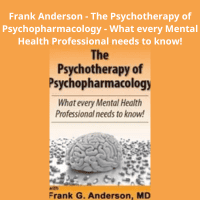This course is designed to equip mental health professionals with a robust understanding of psychopharmacology as it relates to trauma and dissociation. Dr. Frank Anderson, a leading expert in trauma and Internal Family Systems (IFS), guides participants through a nuanced approach to incorporating medication support into psychotherapy. The program emphasizes an integrative model, addressing the neurobiological effects of trauma and how various medications can mitigate dysregulation.
Target Audience: This course is ideal for a wide range of mental health professionals, including:
- Addiction Counselors
- Case Managers
- Counselors
- Marriage & Family Therapists
- Pharmacists
- Psychologists
- Other Mental Health Professionals
Main Learning Objectives & Content:
- Integrating Approaches: Learn to effectively combine psychopharmacological and psychotherapeutic strategies.
- Medication Effects: Identify both the positive and negative impacts of various medications.
- Client Preparation: Develop skills to prepare clients for adding medication to their treatment plans.
- Neurobiology of Trauma: Understand how trauma impacts neurobiological processes and neurotransmitter dysregulation.
- Referral Assessment: Gain expertise in assessing clients for appropriate medication referrals.
- Internal Family Systems (IFS) Integration: Explore how the IFS model can be effectively utilized with medication interventions, understanding the role of “parts of self” in the process.
- Therapist’s Role: Define the therapist’s responsibilities in facilitating medication compliance and ethical considerations.
- Neuroscience and PTSD: Delve into the neuroscience and neurobiology of PTSD, including neural networks, fear response circuitry, and their disruption.
- Specific Medications: Learn about various neurotransmitters and the medications used to address related imbalances, particularly for mood and anxiety disorders often co-occurring with trauma.
- Enhancing Self-Compassion: Strategies for enhancing self-compassion and reducing defenses in clients receiving medication support.
Empower Your Practice: Enroll Now to Master Psychopharmacology for Trauma Treatment!
SIGN UP NOW







